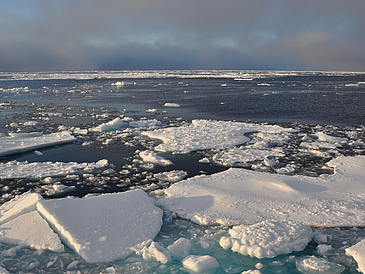The new study shows that the world has reached a crucial point as it approaches various tipping points in the Earth system, according to the University of Exeter. A tipping point is when a small change triggers an often rapid and irreversible change: the effects can be positive or negative.
"Based on an assessment of 26 negative tipping points in the Earth system, the report concludes that 'business as usual' is no longer possible – rapid changes in nature and society have already occurred, and more will follow," explains Ben Marzeion from the Faculty of Social Sciences and MARUM – Center for Marine Environmental Sciences at the University of Bremen.
The climate researcher is co-author of chapter 1.2, which examines tipping points in the cryosphere, i.e. the ice on Earth. "The speed of phasing out the use of fossil fuels and developing carbon-free solutions will now determine the future of billions of people."
With global warming on track to exceed the 1.5-degree mark, it is likely that at least five Earth system tipping points will be triggered – including the collapse of large ice sheets and the widespread death of warm-water coral reefs.
The report sets out a blueprint for this pathway and says that bold, coordinated policy action could trigger positive tipping points in a range of sectors including energy, transport, and food. The report makes six key recommendations for a rapid change of course, including coordinated action to trigger positive tipping points.
- Phasing out fossil fuels and reducing emissions from land use should happen now and be completed well before 2050.
- Strengthening adaptation and governance to deal with climate impacts, taking inequalities between and within nations into account.
- Including tipping points in the global stock take (the global climate "inventory") and national climate contributions (each country's voluntary commitments to tackle climate change).
- Coordinating policy efforts to trigger positive tipping points.
- Convening an urgent global summit on tipping points.
- Deepening knowledge about tipping points. The research team supports the call for an IPCC special report on tipping points.
The report was produced by an international team of more than 200 researchers led by the University of Exeter in collaboration with the Bezos Earth Fund. Ben Marzeion was already a co-author of the 5th and 6th UN Intergovernmental Panel on Climate Change (IPCC) Assessment Reports and one of the lead authors of the IPCC's Special Report on the Ocean and Cryosphere in a Changing Climate, which was published in 2019. In 2023, he is also an evaluator of the State of the Cryosphere 2023 report, which is published by the International Cryosphere Climate Initiative.
Further Information:
After publication, the report will be available to the public at: https://global-tipping-points.org/
Contact:
Prof. Dr. Ben Marzeion
University of Bremen
Climate Geography
Tel.: +49 421 218-67170
E-Mail: ben.marzeion@uni-bremen.de

